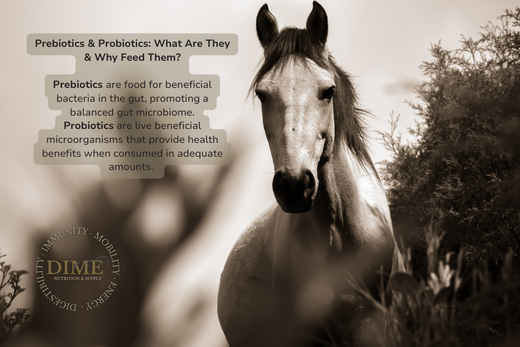
Prebiotics & Probiotics: What Are They & Why Feed Them?
Share
When it comes to maintaining optimal health for our equine companions, nutrition plays a pivotal role. Among the various components of a horse’s diet, prebiotics and probiotics have emerged as essential elements for supporting digestive health and overall well-being. Understanding their significance can help horse owners make informed dietary choices that promote longevity and vitality in their horses.
What Are Prebiotics and Probiotics?
Prebiotics are non-digestible fibers or compounds that serve as food for beneficial bacteria in the gut. They help stimulate the growth and activity of these good bacteria, promoting a balanced gut microbiome.
Probiotics, on the other hand, are live beneficial microorganisms that provide health benefits when consumed in adequate amounts. They help enhance the population of good bacteria in the gut and can support digestive health, immune function, and even mood.
The Role of Prebiotics and Probiotics in Horse Health
1. Enhanced Digestive Health: Horses have a unique digestive system that relies heavily on microbial fermentation. A balanced gut microbiome is crucial for digesting fibrous feeds, absorbing nutrients, and maintaining regular bowel movements. Prebiotics and probiotics work synergistically to ensure that the gut remains healthy and efficient.
2. Strengthened Immune System: A significant portion of a horse's immune system is housed in the gut. A healthy microbiome helps fend off harmful pathogens, reducing the risk of infections and illnesses. By supporting gut health, prebiotics and probiotics contribute to a more robust immune response.
3. Improved Nutrient Absorption: A well-functioning digestive tract is vital for the absorption of essential nutrients. Prebiotics and probiotics can enhance the bioavailability of vitamins and minerals, ensuring that your horse gets the most out of its diet.
4. Stress Management: Horses are sensitive animals, often experiencing stress from training, competition, or environmental changes. This stress can disrupt gut health, leading to issues like colic or diarrhea. Probiotics can help stabilize the gut during stressful periods, promoting a calm and healthy digestive environment.
5. Weight Management: In some cases, prebiotics can help manage a horse’s weight by promoting a feeling of fullness and reducing excessive appetite. This is particularly beneficial for horses prone to obesity or metabolic issues.
How to Incorporate Prebiotics and Probiotics into Your Horse's Diet
Feeding DIME ALL IN: DIME ALL IN includes natural prebiotics and probiotics that are specifically designed for horses. Fermented feeds can also provide beneficial probiotics. Dunbar Milling, LLC does all of our mixing and pelleting, they also have capabilities for fermented feeds and include it in the pet foods. DIME will soon be taking on some of these capabilities in the equine nutrition realm.
All in all, incorporating prebiotics and probiotics into your horse's diet is a powerful way to support digestive health and overall wellness. By fostering a balanced gut microbiome, these supplements can enhance nutrient absorption, bolster the immune system, and improve your horse’s resilience to stress. As always, a well-rounded approach to nutrition, combined with professional guidance, will help ensure that your equine companion remains healthy, happy, and thriving for years to come. Embrace the power of prebiotics and probiotics and give your horse the best chance at a vibrant life!
